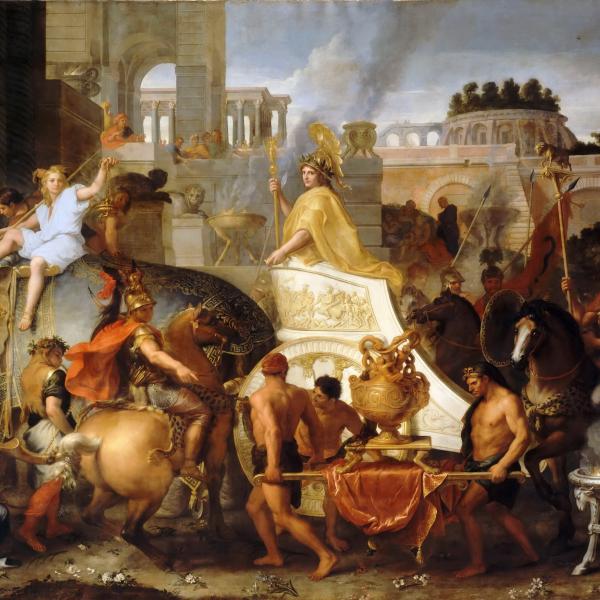By Michelle Kelley
Post-Doctoral Teaching Fellow, Film and Media Studies Program
This past year saw the explosion of the Black Lives Matter movement, a grassroots effort to combat the racialized violence systematically inflicted upon people of color by law enforcement. Opponents of the movement were quick to counter that All Lives Matter, thus effectively denying the movement’s claim that the forms of police violence they seek to counter are racially specific. Despite greater discussion of the politics of race in the context of the Black Lives Matter movement, for the second year in a row, the Academy of Motion Picture Arts & Sciences has failed to nominate any persons of color for acting awards. Films featuring black protagonists have received nods; however in the case of both Creed and Straight Outta Compton, the nominations they’ve garnered have been for a white actor and white writer, respectively.
Saturday Night Live poked fun at this fact in a recent sketch. An awards show presenter introduces a slew of films exploring black subject matter and featuring powerful performances by black actors. These include Punching Upward, an obvious reference to Creed, and All the Beasts of Heaven, an allusion to the Academy-snubbed Beasts of No Nation. Yet only the white men cast in comically minor roles in these films (such as Unseen Voice on Phone) receive nominations. The result of the contest is a five-way tie: The award for Best Actor goes to all “The White Guys.”
 The most productive critiques to emerge from the controversy, identified on Twitter by the hashtag #OscarsSoWhite, have underscored the fact that Hollywood’s problems neither begin nor end with the Academy. Rather, the racial homogeneity of the Academy and its nominees is a reflection of systemic problems within the industry as a whole. These include not only the relative absence of people of color on screen, but also their exclusion from positions of power within the industry. Actors like Mark Ruffalo have situated the controversy in still broader contexts, arguing that the Academy’s diversity problem should be understood as a reflection of structural inequality in American society as a whole.
The most productive critiques to emerge from the controversy, identified on Twitter by the hashtag #OscarsSoWhite, have underscored the fact that Hollywood’s problems neither begin nor end with the Academy. Rather, the racial homogeneity of the Academy and its nominees is a reflection of systemic problems within the industry as a whole. These include not only the relative absence of people of color on screen, but also their exclusion from positions of power within the industry. Actors like Mark Ruffalo have situated the controversy in still broader contexts, arguing that the Academy’s diversity problem should be understood as a reflection of structural inequality in American society as a whole.
Yet not all comments made by actors on the subject have been as enlightened as Ruffalo’s. Recent statements made by actors Stephen Furst, Charlotte Rampling and Meryl Streep reveal a worrisome ignorance of both the persistence of racial inequality and the continued relevancy of racial identity. Furst, for example, took to the pages of the industry trade magazine Variety to protest the Academy’s recently announced efforts to diversify its membership. In a letter addressed to the Academy’s administration, Furst decries the idea that, as he puts it, “old, white, male Academy members are racist, do not appreciate the art of minorities, or refuse to vote for minorities’ work.” Academy Award–nominee Charlotte Rampling has voiced a similar critique, describing a planned boycott of the Oscars as “racist against white people.” She has since apologized for the fact that her words were, as she puts it, “misinterpreted.”
 Furst and Rampling, then, responded to efforts to promote inclusivity as unfairly maligning current (mostly white, mostly male) Academy members. They took umbrage with the suggestion that one’s white racial identity has anything to do with his (and it is usually “his”) capacity for aesthetic discernment. Such a claim, they suggest, actually furthers racism by attributing the Academy’s failure to nominate persons of colors to the racial makeup of the Academy’s membership. Both Furst and Rampling maintain that issues of race can be neatly disentangled from the process of evaluating films. They argue that their ability to assess the quality of a performance or the direction of a scene exists quite apart from the history and continued persistence of racial inequality.
Furst and Rampling, then, responded to efforts to promote inclusivity as unfairly maligning current (mostly white, mostly male) Academy members. They took umbrage with the suggestion that one’s white racial identity has anything to do with his (and it is usually “his”) capacity for aesthetic discernment. Such a claim, they suggest, actually furthers racism by attributing the Academy’s failure to nominate persons of colors to the racial makeup of the Academy’s membership. Both Furst and Rampling maintain that issues of race can be neatly disentangled from the process of evaluating films. They argue that their ability to assess the quality of a performance or the direction of a scene exists quite apart from the history and continued persistence of racial inequality.
Meryl Streep has likewise suggested as much. When asked by a reporter to address the all-white makeup of the jury she chaired at the Berlin Film Festival, she responded, first, by noting the panel’s gender diversity: women predominated. She then proceeded, “There is a core of humanity that travels right down through every culture, and, after all, we’re all from Africa originally.” Streep thus asserts that her own subject position has little to no impact on her capacity to understand films that explore social, cultural and personal experiences quite different from her own.
The comments of Furst, Rampling and Streep are inflected with the same variant of liberal humanism that undergirds the assertion that “All Lives Matter.” Like participants in the “All Lives Matter” countermovement, these actors suggest that the very act of acknowledging the reality of racial inequality is itself racially divisive. Race doesn’t matter, they imply; what matters is our shared humanity across racial divides.
Yet, contrary to the claims of Furst, Rampling and Streep, inequality doesn’t simply cease to exist if we ignore it. To assert that race matters is not to dismiss the importance of shared human values, nor is it deny that race is a social construct, and, therefore, in a sense, a fiction. It is simply to acknowledge that, as a fiction, race has had and continues to have very real effects. The #OscarsSoWhite controversy has fruitfully shown a spotlight on Hollywood’s exclusionary practices. What is needed now is for white Hollywood in particular to refrain from defensive accusations of reverse-racism and spurious appeals to our common humanity. Instead, actors like Furst, Rampling and Streep should listen to and reflect on the powerful critiques of Hollywood that people of color are now voicing, and acknowledge the possibility that they might have something to learn in the process.




